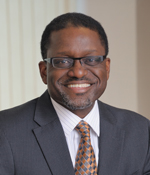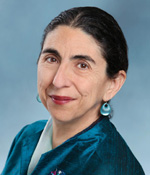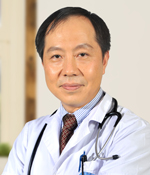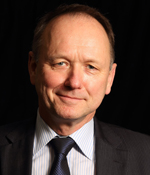
Gary Gibbons
Since the start of ATS President Patricia Finn’s term last year, the ATS has engaged in an initiative to address health equality. For the President’s Symposium from 2 to 4:30 today in Room 6 F (Upper Level) San Diego Convention Center, “Launching Today’s Science Towards Tomorrow’s Care: Local and Global Health Equality,” Dr. Finn has invited four leaders and experts from organizations who will provide an international perspective on the topic: Gary Gibbons, MD, director of the National Heart, Lung, and Blood Institute; Ellen Beck, MD, executive director and co-founder of the University of California, San Diego Student-Run Free Clinic Project; Fu-Qiang Wen, MD, PhD, chair of medicine at Sichuan University in Chengdu, Sichuan, China; and Klaus Rabe, MD, director of the Department of Pneumology at Clinic Grosshansdorf and past president of the European Respiratory Society. Also, Michael E. Wechsler, MD, MMSc, of National Jewish Health in Denver, will discuss the abstract “Anticholinergic vs. Long-Acting Beta-Agonist as Add-On Therapy to Inhaled Corticosteroids in Black Adults with Asthma.”

Ellen Beck
“Health disparities represent a monumental challenge—perhaps the greatest challenge of our time,” Dr. Finn says. “This is why I am thrilled that the ATS community has embraced the health equality initiative, and that our colleagues are also taking steps to address the issue. The leaders I have invited to speak will describe the scientific and cultural impact of health disparities in their regions of the world, as well as their efforts to address those disparities.”
Health disparities are more common for diseases of the respiratory system than for those of other organ systems, according to a joint statement released last year by the ATS and European Respiratory Society. Tobacco smoke, air pollution, environmental exposures, and occupational hazards occur disproportionately in ethnic minorities and those with lower socioeconomic status, and lack of access to quality health care contributes to disparities.

Fu-Qiang Wen
Drs. Gibbons will speak about “The Global Problem of Health Inequality: How NHLBI is Making a Difference.” Dr. Rabe will discuss the intersection of science and health disparities in Europe. Dr. Wen will describe health equality challenges in China and improvements over the past 30 years of reform.
“The health conditions of urban and rural Chinese have improved continuously,” Dr. Wen says. “However, medical treatment is still both difficult to access and expensive. The excessive rise in some medical costs becomes a heavy burden for citizens, especially for rural and unemployed population. So, we still have a long and arduous way to achieve health equality in China. The goal of the Chinese government is to establish a national essential medical system and let all sick people receive medical treatment equally.”

Klaus Rabe
Dr. Beck will describe the highly praised nonprofit UCSD Student-Run Free Clinic Project, which has made an impact on both the local and national levels since its founding in 1997. The clinic is staffed by medical students under the full and direct supervision of faculty and licensed health care professionals, and its transdisciplinary model incorporates the fields of medicine, pharmacy, dentistry, social work, law, nursing, and acupuncture. Not only does the clinic provide free health care to the uninsured and underserved, it also serves as a training ground for students who then incorporate the lessons in their careers. Dr. Beck also created and directs a national faculty development program and an on-site fellowship in underserved health care, which include sessions at the clinic, and allows others to learn and replicate the model in communities throughout the U.S.
“When given high-quality respectful health care that also acknowledges and, when possible, addresses the social determinants of health, people can take charge of their lives and achieve wellbeing as well as excellent outcomes,” says Dr. Beck. “Misconceptions of the underserved include stereotypes and prejudices that they might be unreliable or noncompliant. We teach a philosophy of care that is humanistic, empowering, and transdisciplinary—where the community is the teacher.”
Learn more about these inspiring initiatives today in the President’s Symposium.
